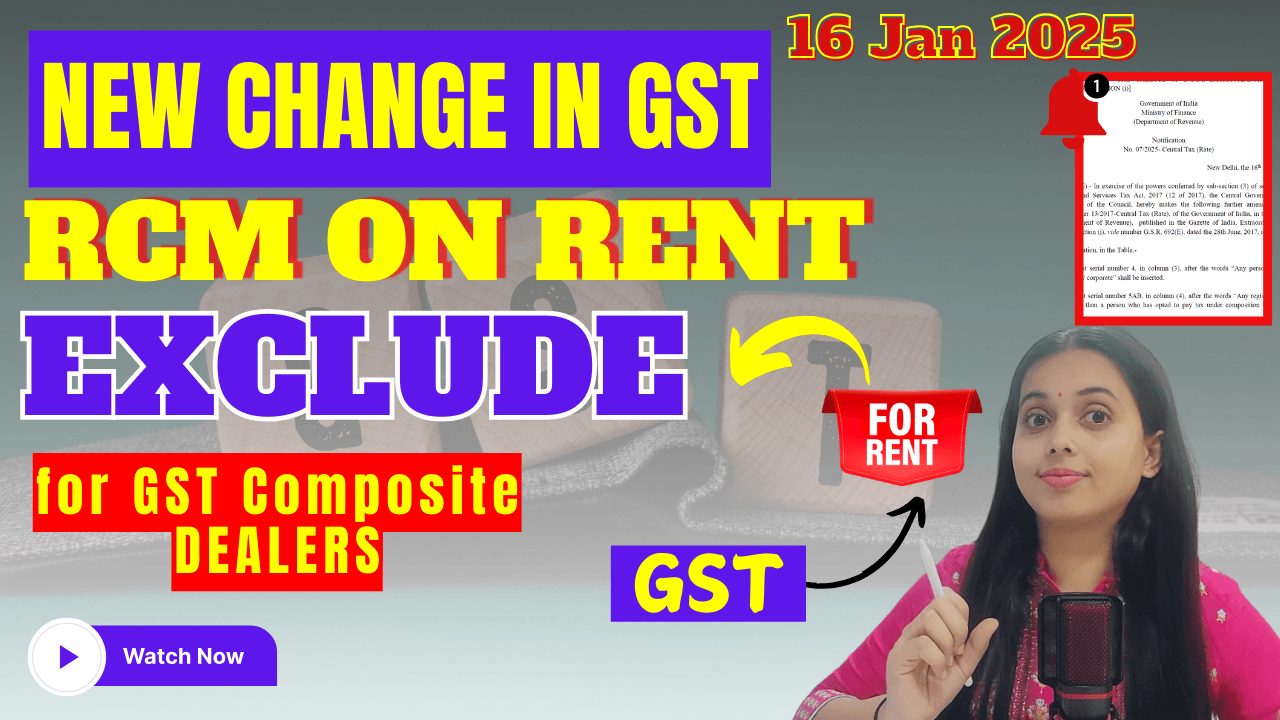RCM on Rent for GST Composition Dealers
RCM on Rent for GST Composition Dealers The Reverse Charge Mechanism (RCM) is a unique aspect of the Goods and Services Tax (GST) system where the liability to pay tax shifts from the supplier to the recipient of the goods or services. This mechanism applies to specific categories of goods or services. One such category involves the renting of immovable property, which is often relevant to Composition Dealers under GST. In this blog, we’ll dive deep into the details of how RCM on rent works for Composition Dealers, including its applicability, tax calculation, and compliance.
For better understanding watch this video https://youtu.be/k1hmAIYX-qs
What is RCM?
Reverse Charge Mechanism (RCM) RCM on Rent for GST Composition Dealers under GST refers to the situation where the recipient of goods or services, instead of the supplier, is liable to pay the tax. Typically, businesses registered under GST collect the tax from their customers and remit it to the government. However, in cases where RCM applies, it’s the buyer (recipient) who bears the responsibility of paying the tax to the government.
RCM on Renting of Immovable Property for Composition Dealers
The renting of immovable property is a taxable supply under GST. However, the application of RCM for GST Composition Dealers depends on specific conditions.
When does RCM apply on Rent?
- Unregistered Landlord: RCM on Rent for GST Composition Dealers RCM applies when the landlord who rents out the property is unregistered under GST.
- Composition Dealer as Recipient: If the Composition Dealer is the tenant (the recipient of the property), the dealer is required to pay tax under RCM.
- Nature of the Property: The GST rate may vary based on the property type (commercial vs. residential) but is generally 18% for commercial property. Residential properties used for residential purposes are typically exempt from GST.
What Types of Rent Are Affected?
RCM applies to rent for commercial property. However, renting of residential property for residential purposes is exempt from GST, provided the property is not used for business purposes.
Tax Calculation under RCM
Under the Reverse Charge Mechanism, the Composition Dealer is liable to pay GST on the rent amount directly to the government. Here’s how the tax calculation works:
Example:
- Monthly Rent for Commercial Property: ₹20,000
- GST Rate: 18% (Standard rate for commercial property under RCM)
- GST Payable: ₹20,000 × 18% = ₹3,600 (This is the GST payable by the Composition Dealer)
The Composition Dealer must deposit this ₹3,600 as GST under RCM, through the GST payment process.
Input Tax Credit (ITC) for Composition Dealers
One important aspect for Composition Dealers is that they cannot claim Input Tax Credit (ITC) on the GST paid under RCM for rent. Since they are part of the Composition Scheme, which is designed for small taxpayers with limited turnover, they are not entitled to claim input tax credit on purchases or expenses. Therefore, even if GST is paid under RCM on rent, no credit can be claimed for the tax paid.
Filing GST Returns and Compliance
For Composition Dealers, reporting and compliance under GST become essential, especially when RCM is involved. Here’s how they should comply with GST regulations:
GSTR-4 Filing:
- RCM Inward Supply: RCM on Rent for GST Composition Dealers The Composition Dealer needs to report the RCM payments in the Inward Supplies under RCM section of GSTR-4. This form is filed quarterly by Composition Dealers, and the dealer must disclose the rent payments made under RCM here.
- GST Payment: The Composition Dealer must pay the GST through their electronic cash ledger. It’s important that the tax is deposited before the due date to avoid penalties.
Maintaining Records:
- Invoices: Dealers must keep track of the rent invoices and any payments made under RCM, as these are essential for audit and verification purposes.
- Documents: Proper documentation should include agreements, rent receipts, and proof of tax payments to ensure full compliance.
Penalties for Non-Compliance
Failure to comply with RCM provisions under GST could result in penalties, interest, and legal consequences. These could arise from:
- Failure to pay GST under RCM on time
- Non-filing of returns (GSTR-4)
- Incorrect reporting of RCM transactions
Penalties for late payment and non-filing can be severe, with interest charges and fines levied on the outstanding tax amount.
Key Takeaways
- RCM on rent applies to Composition Dealers who rent commercial properties from unregistered landlords.
- GST on rent for commercial properties must be paid by the Composition Dealer at 18% under RCM.
- Residential properties used for residential purposes are exempt from GST.
- Composition Dealers cannot claim ITC for GST paid under RCM on rent.
- GST must be reported in GSTR-4, and payments made through the cash ledger.
- Compliance with GST payments and return filings is crucial to avoid penalties and legal issues.
Conclusion
Understanding the applicability of Reverse Charge Mechanism (RCM) on rent for GST Composition Dealers is crucial for smooth operations and ensuring compliance. As the burden of tax payment shifts to the Composition Dealer, proper accounting, timely payment, and filing are essential to avoid penalties and ensure the business runs smoothly.
If you’re a Composition Dealer renting a commercial property from an unregistered landlord, ensure you are well-versed with RCM regulations, and consult a tax professional if necessary to stay compliant with GST requirements.
For More Information : https://taxgyany.com/

